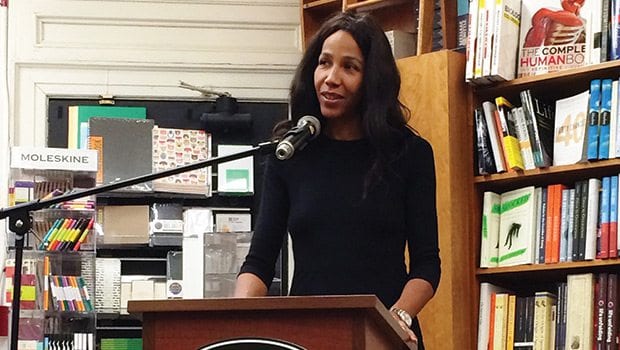
Her grandfather was a mass murderer.
“A man who killed people by the dozens and, what is more, who enjoyed it,” Jennifer Teege read from her international bestseller, “My Grandfather Would Have Shot Me,” to an audience at the Harvard Book Store.
She stood behind a podium reading out loud, with a slight Munich accent, excerpts from her account of her discovery of her family’s German past on Tuesday night, April 21. Teege was at the bookstore as part of her U.S. book tour.

Book jacket
The book is a memoir, co-written by award-winning journalist Nikola Sellmair, of Teege’s journey in researching her family’s dark past during the Holocaust. She said she was distressed and fell into a deep depression when she discovered that her grandfather was the monstrous Płaszów Concentration Camp Commandant Amon Goeth.
“I am the granddaughter of Amon Goeth, a mass murderer who shot hundreds of people. And because I have black skin, he would have shot me, too,” Teege wrote in a blurb for her book.
Teege’s German mother and Nigerian father didn’t raise her when she was a child, and her adoptive family didn’t know of her biological family history. Although she was adopted at age 7, she did have irregular contact with her mother, Monika Goeth, and grandmother, Ruth Irene Goeth, but not her father. They didn’t talk to Teege about the Goeth family history, and it wasn’t until Teege was 38 and found a book on her family that she learned on her own.
At 17, Amon Goeth joined the facist youth organizations. About six years later he joined the Nazi party, then the SS, a militarized security force. Quickly climbing the ranks, he became commandant of the Płaszów concentration camp in Poland. English actor Ralph Fiennes played her grandfather in the Steven Spielberg’s film “Schindler’s List.” Teege said holocaust survivors have told her that the sadistic character was an accurate portrayal. In her book, Teege said she did wonder if she resembled her grandfather in any way.
“But in the course of time I understood that my grandfather and I, we are so different. I would never be able to kill someone. And I would never have dogs trained to tear humans apart,” Teege said.
She said her grandmother, Ruth Irene Goeth, was a very important figure for her life. “My grandmother was not only a person whom I dearly loved but she also provided me with safety,” she said. She said she preferred staying at her grandmother’s place whenever her mother picked her up from her adoptive family, because that meant she didn’t have to be at her mother’s unhappy home, where the then-husband was a “drunkard and a wife-beater,” as stated in her book.
Teege said she questioned her grandmother’s attraction for Amon Goeth. In her book she wrote, “I think she was madly in love with Amon Goeth. Maybe she was also fascinated by his power.” Goeth committed suicide in 1983 a day after she was interviewed for a documentary about Oscar Schindler. Teege was thirteen.
Teege’s mother had a book written about her titled, “I Have to Love My Father, Don’t I?” The subtitle reads, “The life story of Monika Goeth, Daughter of the Concentration Camp Commandmant from ‘Schindler’s List.’” This was the book that Teege serendipitously picked from a library bookshelf back in 2008, and when she first discovered the Geoth’s family dark history. Teege’s mother also spoke about Goeth in the 2003 documentary film, “Amons Tochter.” Teege said she hasn’t been in contact with her mother and doesn’t even know if her mother had read her bestseller book.
Teege’s family discovery led her to explore how both descedents of the Holocaust victims and perpetrators dealt with their family’s past. She read about siblings who sterilized themselves to end their bloodline because they were decedents of the perpetrators. She said she disagreed with that attitude.
“I thought that was terribly wrong because we decide for ourselves who we want to be, it is not blood who defines a character,” she said, bringing a point that spreading this message was among many reasons for sharing her story.
Fredi Dworkin, 61, Jewish woman living in East Boston, watched the film documentary, “Amons Tochter,” before meeting Jennifer Teege at the book reading. “I had a strong reaction to her mother, I’ve been very drawn to her,” she said. “We all have complicated questions about who are we and how do we deal with the culture that impacts our families, and we all deal with it. But with their family, it’s more dramatic.”
Ben Flex, 21, now living in Cambridge, studied slave narratives and the public memory of slavery. He asked multiple questions during the Q&A and stayed to talked with Teege after her book signing. “You don’t really hear a lot from the other side, and I thought it was a humbling experience to hear someone else’s discussion,” Flex said. “It takes a lot out of someone to be willing to write about it, speak about it, and come here to let people ask questions about it.”






